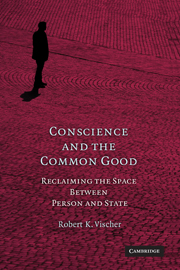7 - Corporations
Published online by Cambridge University Press: 05 June 2012
Summary
Imagining a role for pharmacies in the flourishing of conscience opens a broader inquiry: Are corporations, as a category, positioned to support the relational dimension of conscience, and if so, how should the law facilitate that function? Corporations occupy a significant segment of the vast space between the intimacy of the family and the anonymity of the state. This chapter explores the broad implications that conscience's relational dimension has for our understanding of corporations and their role in society. The first part examines whether for-profit corporations may properly be considered venues for the communal expression and implementation of conscience, looking specifically at the capacity of corporations such as Wal-Mart to carve out moral identities as marketplace actors that diverge from the norms embraced by the broader society. In the second part, I shift the inquiry to the internal environment of the corporation, exploring the tension between a corporate community's constituent-driven moral identity and the exercise of conscience by dissenting community members, particularly employees.
CORPORATE CONSCIENCE IN THE MARKETPLACE
As a marketplace actor, the corporation is a moral agent with the capacity for exercising a robust institutional conscience – not in the sense that the corporation actually exists as a conscience-wielding being, but in the sense that the corporation serves as a venue and vehicle for the sharing of conscience-driven claims among its constituents.
- Type
- Chapter
- Information
- Conscience and the Common GoodReclaiming the Space Between Person and State, pp. 179 - 205Publisher: Cambridge University PressPrint publication year: 2009



